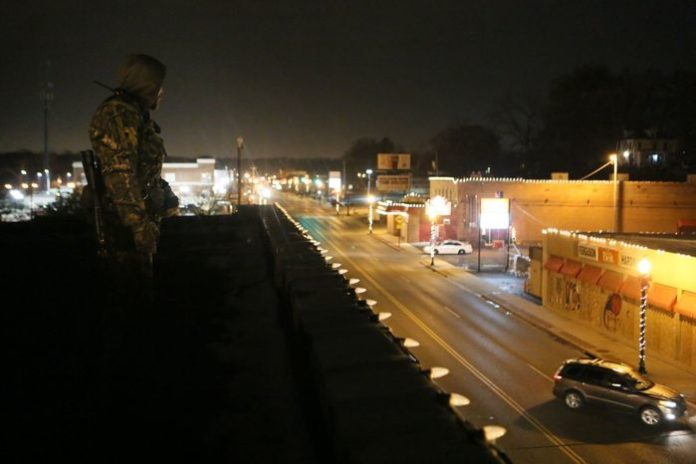Last week, residents of Ferguson, Missouri might have noticed a strange sight amidst the scenes of burning buildings, overturned cars, crazed rioters, and police in full military dress. Standing stoically on the rooftops of buildings in areas threatened by prolonged rioting were men dressed in masks and camouflage, armed with buckets of water, fire extinguishers, and occasionally AR-15 rifles.
These men were not members of the Ferguson Police Department or the Missouri National Guard. They were members of the Oath Keepers, a nationwide collective of military veterans, former law enforcement officers, first responders and other concerned citizens who have sworn an oath to protect and defend the Constitution. They were drawn to Ferguson to help protect the people and property of the town from the rioters and criminals, who largely had avoided being stopped by the police and National Guard troops.
While the appearance of the Oath Keepers came as a relief to citizens and small business owners affected by the riots, to the authorities they posed a threat. That’s right. Within just days of arriving, rather than being thanked by the police for volunteering to help protect lives and property, these law-abiding volunteers were ordered to get out of town, apparently for “operating without a license.”
Absurd as it is that a person would need a “license” to do nothing more than protect private property from wanton destruction — especially when the police force’s apparent “best efforts” to do so were woefully deficient — that is exactly how government views the right to self-defense in the Bizarro World of 21st Century America.
While the government’s assault on the principle of self-defense underlying the Second Amendment is nothing new, the degree to which federal and state officials misunderstand or simply choose to ignore the fundamental principle of self-defense, is truly disheartening.
Many people consider that the modern era of gun control began in the late 1960s following the assassination of Robert Kennedy; but it actually dates to 1934 when the Congress passed the 1934 National Firearms Act. Since that seminal event, a distinct anti-firearms philosophy has taken hold in large segments of society; one that considers personal ownership of a firearm not as an exercise of a God-given right to defend oneself, but rather as a direct threat to “public safety.” Adherents of this group-centric philosophy consider the right to defend oneself with a firearm as something separate from — indeed, inferior to — the collective responsibility of government to protect society. In this world view, “public safety” trumps both individual responsibility and individual liberty.
Employing footholds gained through advocacy in the legislative, judicial and executive branches at all levels of government, these anti-gun forces have worked steadily to transmogrify the Second Amendment into a public-policy commodity, subject to the at-will regulation of government officials. The ultimate goal of this movement is to empower government as the exclusive owner of the means to personal defense; thus relegating citizens to a position of absolute reliance on the government for their personal and property protection. It is all about Control.
The historically-sound notion that citizens possess primary responsibility for protection of their persons and property, is reflected not only in the clear intent of the Second Amendment, but as well in federal court decisions. For example, in 1981, the U.S. Court of Appeals for the D.C. Circuit noted in Warren v. District of Columbia, that “. . . government and its agents are under no general duty to provide public services, such as police protection, to any particular citizen.” This assertion was reiterated a year later by the Seventh Circuit, in Bowers v. DeVito, when that Court held “there is no constitutional right to be protected by the state.”
Government, of course, wants to have it both ways. While accepting it is under no absolute obligation to protect citizens from harm (thereby avoiding liability for failing to protect against criminal actions), government officials constantly seek to acquire and maintain a monopoly of the means by which individuals are able to exercise their responsibility to protect themselves – that is, by remaining free to exercise their Second Amendment right to keep and bear arms. Thus the bizarre spectacle of police in Ferguson rejecting efforts by citizens to protect lives and property when most critical to do so.
Unfortunately, the reaction by state and local authorities in Ferguson to citizen-based self-defense represents not the exception, but the prevalent view of “public safety”; and not only in the United States but throughout western society generally. It is, however, particularly discouraging that such a fundamentally flawed understanding of individual rights and constitutional history are run amuck here, in what Ronald Reagan correctly described as “the last best hope of man on earth.”































